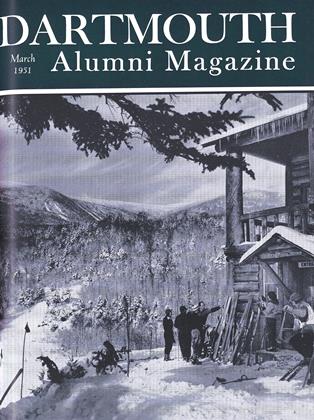by RudiBlesh '21 and Harriet Janis. Alfred A. Knopf,x950> 374 PP., $4.00.
Between 1893 and 1904, Chicago, Omaha, Buffalo, and St. Louis put on great expositions. Along their midways drifted ragtime, which Mr. Blesh and Miss Janis call "far and away the gayest, most exciting, most infectiously lilting music ever heard." The sight-seers loved it. Back home, they bought sheet music and pianola rolls of the latest "rags" and listened to cylinder records of Sousa's band struggling solemnly with the Cakewalk. For twenty years ragtime rhythms dominated popular music. Then in 1917 they vanished into the bars in which they originated. But ragtime had prepared the way for jazz and had significantly affected much of the "serious" modern music of Europe and America.
Working with faded scores, rare records and rolls, and interviews with some of the men who made ragtime an international craze, the authors have written the first book on the now nearly forgotten music. With the persistence and enthusiasm of the almost too serious students of jazz and its forerunners, they have followed the growth of ragtime from Negro folk melodies to million-dollar hits and the strange, pathetic ragtime opera, "Treemonisha," written by Scott Joplin, the Negro "king of ragtime," as madness closed in on him. The reader may find their unrelenting superlatives a little hard to accept, but he will be grateful for the wealth of first-hand material, the lists of sheet music, rolls, and records, and the thoughtful inclusion of a piano arrangement of Joplin's greatest hit, MapleLeaf Rag.
A long, uneven, but always interesting study, They All Played Ragtime is a useful contribution to the history of American folk music and culture.
 View Full Issue
View Full Issue
More From This Issue
-
 Article
ArticleFree Enterprise in Ideas
March 1951 By HENRY STEELE COMMAGER -
 Class Notes
Class Notes1929
March 1951 By F. WILLIAM ANDRES, EDWIN C. CHINLUND, GEORCE B. REDDING6 more ... -
 Class Notes
Class Notes1905
March 1951 By GEORGE W. PUTNAM, GILBERT H. FALL, FLETCHER A. HATCH -
 Class Notes
Class Notes1918
March 1951 By ERNEST H. EARLEY, DONALD L. BARR, RICHARD A. HOLTON -
 Article
ArticleThe Undergraduate
March 1951 By PETE -
 Class Notes
Class Notes1923
March 1951 By TRUMAN T. METZEL, COLIN C. STEWART 3RD, LEON H. YOUNG JR.
JOHN L. STEWART
Books
-
 Books
BooksAlumni Articles
NOVEMBER 1966 -
 Books
BooksHAWAII WITH SYDNEY A. CLARK,
June 1939 By Alexander Laing '25 -
 Books
BooksWINTER IN VERMONT
December 1941 By Harold G. Rugg '06 -
 Books
BooksPREPOSTEROUS PAPA.
January 1960 By HERBERT F. WEST '22 -
 Books
BooksWonder and Humility
SEPTEMBER 1982 By Nelson Bryant '46 -
 Books
BooksNotes on some gentlemen songsters, with an aside on "antique and toothless alumni"
December 1976 By R.H.R.





